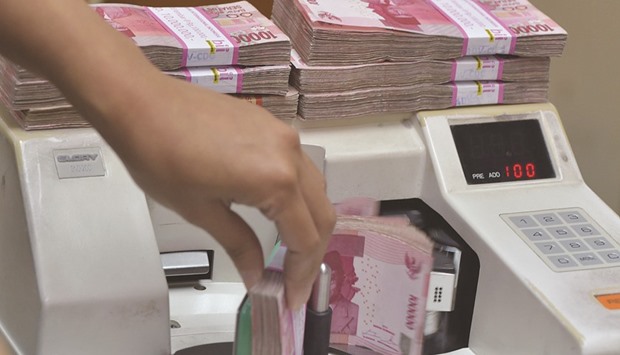Indonesia’s rupiah plunged to a five-month low, prompting the nation’s central bank to say it stepped in to stabilise the local currency and bond markets.
The rupiah fell 1.1% to 13,288 per dollar in Jakarta, its biggest decline since May 19, according to prices from local banks compiled by Bloomberg.
It earlier dropped as much as 3%, the most on an intraday basis since September 2013, to a five-month low of 13,545.
Bank Indonesia officials confirmed intervention after the rupiah declined with Asian currencies. Sentiment toward emerging-market assets soured on speculation a Donald Trump- administration will lead to protectionism and prompt more aggressive tightening by the Federal Reserve.
Malaysia’s ringgit dropped to its weakest level since January and India’s rupee sank to the lowest in more than two months.
State-run banks sold dollars on behalf of the Reserve Bank of India, according to two Mumbai-based traders, who asked not to be identified.
“It’s more a smoothing action because of the velocity of the moves today,” said Jeffrey Halley, a market strategist at Oanda Asia Pacific Pte in Singapore.
“They’re not going to try to stand in front of a freight train. We may see more of this going forward.”
The rupiah weakened after a few short-term investors rushed to the non-deliverable forwards market to hedge, causing the contracts to drop significantly, Nanang Hendarsah, head of financial market deepening at the central bank, said by mobile phone text message. The authority is ready to buy government bonds and intervene in the foreign-exchange market to maintain stability, Senior Deputy Governor Mirza Adityaswara told reporters in Jakarta.
Indonesia’s 10-year sovereign bond yield jumped 40 basis points, the most since January 2014, to 7.88%, while the Jakarta Composite Index of shares sank 4%.
Mexico’s peso, South Korea’s won, South Africa’s rand and Poland’s zloty dropped more than 1%, putting a gauge of emerging-market currencies on course for its worst three-day rout since 2011.
Taiwan’s dollar and India’s rupee fell at least 0.7% each and the Philippine peso slid 0.6%.
The prospect of increased spending under Trump’s presidency propelled the Bloomberg Dollar Spot Index to the highest since March on Thursday.
The US could drop out of Trans-Pacific Partnership trade deal within his first 100 days in office, Politico reported, citing an internal transition team document.
“The rupiah fell in response to declines in the region,” said Branko Windoe, head of treasury at PT Bank Central Asia, Indonesia’s largest bank by market value. “We’ve seen since the US election, looking at the policies outlined during Trump’s campaign, people are trying to calculate the impact on Asia, especially on trade.”

An employee counts rupiah banknotes at a money changer’s office in Jakarta. The rupiah plunged to a five-month low yesterday, prompting the nation’s central bank to say it stepped in to stabilise the local currency and bond markets.
